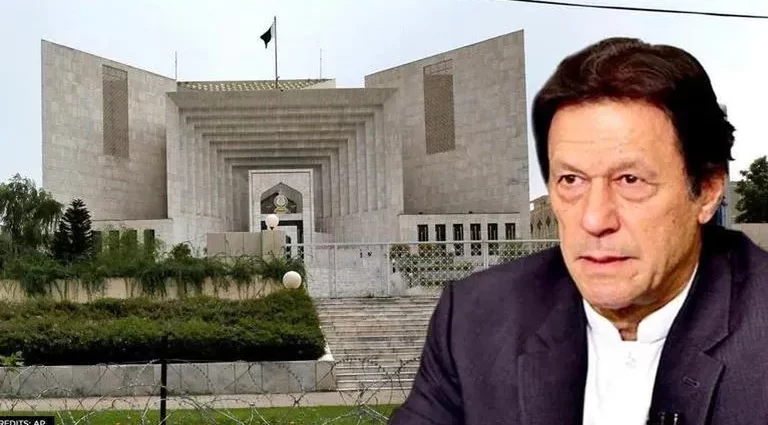Apex court to take up Chairman PTI’s plea in Toshakhana case on Wednesday
ISLAMABAD ( Web News )
A three-member bench headed by Chief Justice of Pakistan (CJP) Justice Umar Ata Bandial will take up Pakistan Tehreek-e-Insaf (PTI) Chairman Imran Khan’s petition challenging the Islamabad High Court’s (IHC) decision on the Toshakhana case on Wednesday (August 23) at 11:30 AM.
Apart from CJP Bandial, the bench will comprise Justice Sayyed Mazahar Ali Akbar Naqvi and Justice Jamal Khan Mandokhail. Imran Khan filed petitions against District Election Commissioner, Islamabad and others. Imran Khan has filed the petitions through Khawaja Haris Ahmad and Gohar Ali Khan.
Imran Khan had challenged the jurisdiction of the court to hear the case, to transfer the case from the court of Additional District and Sessions Judge Islamabad (West) Humayun Dilawar to some other court and for recording the statements of his witnesses.
They will hear the plea filed by the PTI chairman on August 5 challenging the IHC’s decision that declared the sessions court’s maintainability verdict in the Toshakhana case against the PTI chief “void”.
IHC Chief Justice Aamer Farooq gave the court’s ruling on eight petitions of the PTI chairman after arguments by both parties — which were completed.
The court, however, rejected the former prime minister’s request to transfer the case to another court and said that Additional District and Sessions Judge Islamabad (West) Humayun Dilawar would hear the case.
On October 21, 2022, the Election Commission of Pakistan (ECP) maintained that the former prime minister made “false statements and incorrect declarations” about the gifts and disqualified him under Article 63(1)(p) of the Constitution.
Subsequently, the election watchdog moved the session’s court to the federal capital. It sought criminal proceedings against the PTI chief for allegedly misleading the ECP regarding gifts received from foreign dignitaries while he was in office.
The PTI chief was indicted in the case on May 10, while his petition to declare the case inadmissible was rejected by the court.
On July 4, the IHC overturned the same ruling and directed the sessions court to hear the petitioner and decide the matter within seven days.
On July 8, ADSJ Humayun Dilawar declared the Toshakhana case against Khan as maintainable, which was again challenged in the IHC.
Meanwhile, the trial continued at the court and a day after the IHC verdict PTI Chairman Imran Khan was arrested from his Zaman Park residence in Lahore soon after being convicted in the Toshakhana case.
The sessions court in the federal capital convicted the former prime minister for corrupt practices related to the state gift depository — allegations which he denies.
The 70-year-old cricketer-turned-politician was accused of misusing his premiership to buy and sell gifts in state possession that were received during visits abroad and worth more than 140 million Pakistani rupees ($635,000).
Rejecting Khan’s petition seeking inadmissibility of the case, Additional and Sessions Judge Humayun Dilawar sentenced the former prime minister to three-year imprisonment.
“Charges of misdeclaration of assets have been proven against PTI chairman,” Judge Dilawar mentioned in his judgment.
He then handed Khan three years in jail along with a fine of Rs100,000, while issuing an arrest warrant for his immediate arrest.
Established in 1974, Toshakhana is a department under the administrative control of the Cabinet Division and stores precious gifts given to rulers, parliamentarians, bureaucrats and officials by heads of other governments and states and foreign dignitaries as a goodwill gesture.
It has valuables ranging from bulletproof cars, gold-plated souvenirs and expensive paintings to watches, ornaments, rugs and swords.

